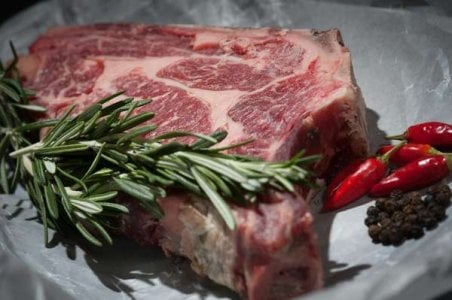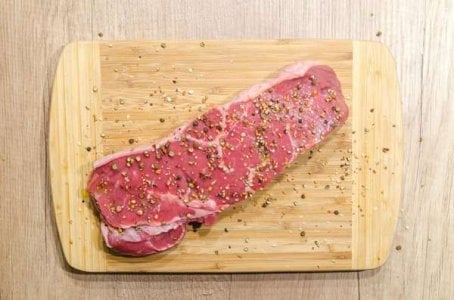Controversy over Coles' use of 'Bovaer' in beef—what to know before your next meat purchase!
By
Maan
- Replies 72
The food we eat is more than just a meal—it’s a choice that can spark conversation and concern.
Whether it's product safety, sustainability, or consumer choice, many factors can impact our shopping decisions.
Read on to find out what you need to know before your next purchase.
Aussies have expressed outrage at Coles, vowing to boycott the supermarket after it expanded the use of a controversial cattle feed supplement aimed at reducing greenhouse gas emissions.
In November 2023, Coles announced that select beef suppliers would adopt the use of Bovaer, following trials that showed the supplement could reduce methane emissions by 'at least 50 per cent'.
However, it’s worth noting that Beef in Coles' standard range does not come from cattle fed with Bovaer. The supplement is only used in their premium 'Finest Carbon Neutral' product line.
Bovaer works by suppressing an enzyme in cows that produces methane, a greenhouse gas linked to climate change.
The supplement comprises silicon dioxide, propylene glycol, and 3-nitrooxypropanol (3-NOP), and is manufactured by Swiss-Dutch company DSM-Firmenich.
Although there is no evidence suggesting the additive poses health risks or transfers to meat or milk, claims on social media have linked it to fertility issues and cancer.
Experts, however, have dismissed these concerns as unfounded.
Despite the assurances, many concerns have flourished, prompting some dairy suppliers to clarify their positions.
Victorian farm Bass River Dairies proudly declared their milk as ‘full fart milk’, free from cows fed Bovaer, while Norco also confirmed it had no plans to use the supplement.
‘At Norco, we pride ourselves on making quality, natural dairy products,’ a company representative stated.
Critics of the Bovaer, including former federal MP Craig Kelly, chimed in.
‘Well done Norco, listening to the public,’ Kelly said.
‘We don’t want to drink milk from cows drugged with Bovaer. And we also don’t want to eat meat from cattle drugged with Bovaer – so all Coles meat is off the shopping list,’ Kelly added.
Kelly’s sentiments were echoed by hundreds of social media users. One commenter stated, ‘Coles don’t sell anything you can’t get elsewhere.
The comment continued, ‘They will never get another cent from me – I have been a loyal Coles shopper for 30 years.’
Another remarked, ‘A sizable group of your customers don’t want to eat food that you have tampered with. We just want wholesome natural food.’
Coles defended its decision, with a spokesperson saying, ‘Coles prioritises food safety and animal welfare and we are committed to improving the sustainability of our business. Bovaer has been extensively researched over the past 15 years and approved by leading food safety organisations including Food Standards Agency UK and the European Food Safety Authority.’
The controversy isn’t confined to Australia. In the UK, customers have threatened to boycott dairy giant Arla over its use of Bovaer, with major retailers Tesco and Asda stocking its products.
Arla has pushed back, calling it ‘misinformation’ spreading on social media.
Adding to the discussion, Microsoft co-founder Bill Gates invested heavily in Rumin 8, a company developing similar methane-reducing additives, earlier in 2023. He made the investment through his firm, Breakthrough Energy Ventures..
Some confusion has arisen between Rumin 8 and Bovaer, as both aim to tackle methane emissions.
While approved for use in countries including Australia and the UK, Bovaer’s introduction has highlighted the tension between sustainability efforts and consumer acceptance.
As the conversation around food and climate change continues to evolve, companies are stepping up in surprising ways.
In a previous story, we talked about how one major retailer tackled this issue, one cattle at a time. Find out more here!

What are your thoughts on using additives like Bovaer in the food supply? Share your opinion in the comments below.
Whether it's product safety, sustainability, or consumer choice, many factors can impact our shopping decisions.
Read on to find out what you need to know before your next purchase.
Aussies have expressed outrage at Coles, vowing to boycott the supermarket after it expanded the use of a controversial cattle feed supplement aimed at reducing greenhouse gas emissions.
In November 2023, Coles announced that select beef suppliers would adopt the use of Bovaer, following trials that showed the supplement could reduce methane emissions by 'at least 50 per cent'.
However, it’s worth noting that Beef in Coles' standard range does not come from cattle fed with Bovaer. The supplement is only used in their premium 'Finest Carbon Neutral' product line.
Bovaer works by suppressing an enzyme in cows that produces methane, a greenhouse gas linked to climate change.
The supplement comprises silicon dioxide, propylene glycol, and 3-nitrooxypropanol (3-NOP), and is manufactured by Swiss-Dutch company DSM-Firmenich.
Although there is no evidence suggesting the additive poses health risks or transfers to meat or milk, claims on social media have linked it to fertility issues and cancer.
Experts, however, have dismissed these concerns as unfounded.
Despite the assurances, many concerns have flourished, prompting some dairy suppliers to clarify their positions.
Victorian farm Bass River Dairies proudly declared their milk as ‘full fart milk’, free from cows fed Bovaer, while Norco also confirmed it had no plans to use the supplement.
‘At Norco, we pride ourselves on making quality, natural dairy products,’ a company representative stated.
Critics of the Bovaer, including former federal MP Craig Kelly, chimed in.
‘Well done Norco, listening to the public,’ Kelly said.
‘We don’t want to drink milk from cows drugged with Bovaer. And we also don’t want to eat meat from cattle drugged with Bovaer – so all Coles meat is off the shopping list,’ Kelly added.
Kelly’s sentiments were echoed by hundreds of social media users. One commenter stated, ‘Coles don’t sell anything you can’t get elsewhere.
The comment continued, ‘They will never get another cent from me – I have been a loyal Coles shopper for 30 years.’
Another remarked, ‘A sizable group of your customers don’t want to eat food that you have tampered with. We just want wholesome natural food.’
Coles defended its decision, with a spokesperson saying, ‘Coles prioritises food safety and animal welfare and we are committed to improving the sustainability of our business. Bovaer has been extensively researched over the past 15 years and approved by leading food safety organisations including Food Standards Agency UK and the European Food Safety Authority.’
The controversy isn’t confined to Australia. In the UK, customers have threatened to boycott dairy giant Arla over its use of Bovaer, with major retailers Tesco and Asda stocking its products.
Arla has pushed back, calling it ‘misinformation’ spreading on social media.
Adding to the discussion, Microsoft co-founder Bill Gates invested heavily in Rumin 8, a company developing similar methane-reducing additives, earlier in 2023. He made the investment through his firm, Breakthrough Energy Ventures..
Some confusion has arisen between Rumin 8 and Bovaer, as both aim to tackle methane emissions.
While approved for use in countries including Australia and the UK, Bovaer’s introduction has highlighted the tension between sustainability efforts and consumer acceptance.
As the conversation around food and climate change continues to evolve, companies are stepping up in surprising ways.
In a previous story, we talked about how one major retailer tackled this issue, one cattle at a time. Find out more here!
Key Takeaways
- Coles has been criticised by some Australians who are boycotting the supermarket due to its use of a cattle feed supplement called Bovaer, which is intended to lower greenhouse gases by reducing methane emissions from cattle.
- The supplement, Bovaer, made by DSM-Firmenich, includes 3-nitrooxypropanol (3-NOP) and is solely used for Coles' premium 'Finest Carbon Neutral' beef line, not in their general range of beef products.
- Despite assurances from experts that Bovaer is safe and poses no risk of cancer or transfer to milk or meat, some have taken to social media to voice concerns about potential health effects, including fertility issues and cancer risks.
- Coles and suppliers of Bovaer have defended the product's use, stating that it has been thoroughly researched, approved by leading food safety organisations, and is safe for consumers. Critics, including former politician Craig Kelly, advocate against the use of such supplements, influencing some dairy suppliers to confirm they do not use Bovaer.
What are your thoughts on using additives like Bovaer in the food supply? Share your opinion in the comments below.









